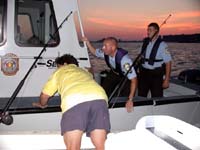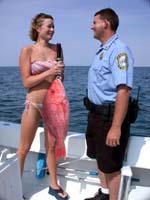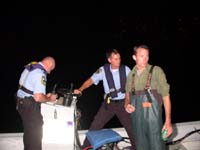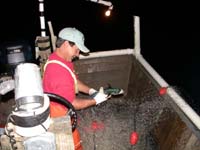
|
Features
|
|
|
|
Books
|
|
|
|
Fun & Games
|
|
|
|
Contact Us
|
|
|
John's Journal... Entry 251, Day 2
FISH COPS: THE WATCHDOG OF THE MARINE RESOURCES
Check For Drugs
 Editor's
Note: As you know, salt-water fishing has a numberof size limits, bag
limits and restrictions. But do you know who enforces these laws? Who
keeps the commercial fishermen, the netters, the oystermen and the recreational
fishermen from breaking the law, taking too many fish and/or fishing in
closed areas? In my home state of Alabama and many other states, the Enforcement
Division of the Marine Resources Department of the state's Department
of Conservation and Natural Resources (DCNR) has this responsibility.
To learn more about who the fish cops are, what they do, and why they
are important to all of us, I went on patrol with them in coastal areas
recently at night and during the day. I learned that they have some of
the most-sophisticated surveillance equipment of any law enforcement agency.
Besides radar, they have night-vision binoculars and other devices to
spot and track law violators. They also do drug enforcement, health-department
enforcement and immigration enforcement and are cross-trained with many
state and federal agents. This week we'll meet Alabama's fish cops, the
Alabama Marine Resources Enforcement Division (AMRED), and learn what
they do.
Editor's
Note: As you know, salt-water fishing has a numberof size limits, bag
limits and restrictions. But do you know who enforces these laws? Who
keeps the commercial fishermen, the netters, the oystermen and the recreational
fishermen from breaking the law, taking too many fish and/or fishing in
closed areas? In my home state of Alabama and many other states, the Enforcement
Division of the Marine Resources Department of the state's Department
of Conservation and Natural Resources (DCNR) has this responsibility.
To learn more about who the fish cops are, what they do, and why they
are important to all of us, I went on patrol with them in coastal areas
recently at night and during the day. I learned that they have some of
the most-sophisticated surveillance equipment of any law enforcement agency.
Besides radar, they have night-vision binoculars and other devices to
spot and track law violators. They also do drug enforcement, health-department
enforcement and immigration enforcement and are cross-trained with many
state and federal agents. This week we'll meet Alabama's fish cops, the
Alabama Marine Resources Enforcement Division (AMRED), and learn what
they do.
 Phillips:
One of the members of our crew,while we were on nightpatrol was Captain
Glenn Kornegay. What kind of drug cases have you had Captain Kornegay?
Phillips:
One of the members of our crew,while we were on nightpatrol was Captain
Glenn Kornegay. What kind of drug cases have you had Captain Kornegay?
KORNEGAY: Most of the cases we have had have been what we call plain-view
cases. In other words, we make the case when the drugs are in plain view.
For instance, one night I was arresting a suspect. As he took his hands
out of his pockets, he threw his dope in the water. So, we recovered the
dope and arrested him on a drug violation as well as a fishing violation.
 PHILLIPS:
What is the worst violation you have ever seen as far as a fishing violation
goes?
PHILLIPS:
What is the worst violation you have ever seen as far as a fishing violation
goes?
KORNEGAY: I caught a fellow one time on a routine check who had 35-undersized
red snapper. We were checking the fishermen at the dock after a day of
fishing. We let the fishermen pull their boats out of the water and get
them up on the trailers. Once this boat was out of the water, I approached
the fisherman, boarded the boat and found the undersized snapper. I asked
the angler how they got all these undersized snapper. The fisherman said,
"I just couldn't stop catching them." The fine for having all
those short snapper was over $2,000.
PHILLIPS: I asked Captain Chris Blankenship "What
is one of the worst violations you have ever seen?"
BLANKENSHIP: One Sunday I was checking fishermen at the Causeway just
outside of Mobile near the battleship "Alabama". As I approached
this fisherman, he had a fish on the line, and I noticed he didn't have
an ice chest. When he brought the fish in, he just seemed to put the redfish
in the rocks. While I was talking with him, he caught another redfish.
He also put that fish in the rocks and cast out and caught a third fish.
Now the limit on redfish in Alabama is three fish, and this guy was catching
redfish so fast and not caring for them very well, that I began to look
around the rocks. I found a croaker sack right behind the fisherman, and
I could see fish moving around in that sack. I counted the fish in the
sack, and the man had 30 redfish in the sack besides the three I had just
seen him catch. When I asked him why he had kept so many red fish, he
said, "The fish were biting so well, and I was catching so many fish,
that I just couldn't stop." Because the fisherman couldn't stop,
he paid a $500 fine.
 PHILLIPS:
What is the most-common violation?
PHILLIPS:
What is the most-common violation?
BLANKENSHIP: Our most-common violation is fishing without a salt-water
fishing license. If you're fishing in the State of Alabama in salt water,
and not on a charter boat, you have to have a salt-water fishing license.
This license costs residents $16.00, and non-residents have to pay the
same amount for their salt water fishing license that Alabama fishermen
have to pay when they go to that fisherman's state and buy a fishing license.
For instance, if you are from Louisiana, which charges out-of-state fishermen
$67.00 for an out-of-state salt water fishing license, then you have to
pay $67.00 for an Alabama fishing license. However, most out-of-state
licenses are only about $31.00.
TOMORROW: REEF VIOLATIONS
Check back each day this week for more about FISH COPS: THE WATCHDOG OF THE MARINE RESOURCES ...
Day 1 - What Is AMRED?
Day 2 - Check For Drugs
Day 3 - Reef Violations
Day 4 - Lady Fish Cops
Day 5 - Heidi Lofton, The Other Lady Cop